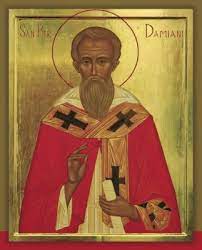HOMILY LENT WEEK 01 03 – Year II
Repent, Believe and Heal:
Optional Memorial of St. Peter Damian
(Jonah 3:1-10; Ps 51; Lk 11:29-32)
*****************************************
The people of Nineveh — proclaimed a fast and all of them, great and small, put on sackcloth. (Jonah 3:5)
Today’s readings proclaim a clear message – believe and repent, which coincides with the first words Jesus preached, “Repent and believe, for the kingdom of God is near” (Matthew 3:2)
Facing resistance to his preaching and presence, Jesus finally points to a “sign of Jonah,” which is essentially the first reading. Jonah ran away from the call of God, and ended up in the belly of a whale for three days and nights. Transformed by that experience, a newly repentant Jonah goes to Nineveh to deliver God’s message, and is astounded as they both believe the message, and repent from the heart to a person (including even the animals). Their faith in the message transforms their ways and their lives. This is an idealized portrait of God’s desire for God’s people – that they would similarly repent from the heart.
In the gospel, the faith Jesus is looking for is to believe in him as the Messiah, and as the crucified Lord who would suffer, die, be buried, and rise again from the dead. The repentance Jesus is looking for is metanoia, putting on our highest mind, and being the very best person God has created us to be. Jesus was preparing the people for what we now call the Paschal Mystery, and inviting us today to put our faith in him, to willingly take up our cross and follow him through that pattern in our own lives.
Psalm 51 expounds on this mystery. God responds to repentance, to a broken, humbled heart. And the new life of Christ will come to us through forgiveness and healing, the two-fold role of the Messiah – to redeem and to sanctify, expressed in the psalm by the words “Wash me thoroughly from my iniquity, and cleanse me from my sin.
Robert was advised by a retreat master to look over the pattern of his sins and find the main one. What he discovered in the process was that he did not really trust in God’s providence, that God would be there for him in the end. Looking around his room, he suddenly realized how materialistic he had become because of this lack of faith – with the best of every technological gadget. Newly repentant, he resolved to start to downsize, simply and de-clutter his life. He was living the readings for today.
 Today the Church honours someone who truly lived the readings for today. St Peter Damian is a Doctor of the Church, so honored for his writings, as well as his work for reform and renewal of the Church. Peter was born in 1007 into a large family in Ravenna, Italy. He was orphaned at a very young age, and the first brother to care for him treated him very badly. Another brother, however, recognized Peter’s brilliance and arranged for schooling. Perter appreciated this so much that he took on his brother’s name and called himself Peter Damian. He became a hermit monk and was eventually chosen superior of his community. In 1058 he was appointed bishop of Ostia. Throughout his life he fought for clerical reform and against the laxness and immorality of the clergy of his day. Eventually, he received permission from Pope Alexander to return to the simple life of a monk. He died in 1072.
Today the Church honours someone who truly lived the readings for today. St Peter Damian is a Doctor of the Church, so honored for his writings, as well as his work for reform and renewal of the Church. Peter was born in 1007 into a large family in Ravenna, Italy. He was orphaned at a very young age, and the first brother to care for him treated him very badly. Another brother, however, recognized Peter’s brilliance and arranged for schooling. Perter appreciated this so much that he took on his brother’s name and called himself Peter Damian. He became a hermit monk and was eventually chosen superior of his community. In 1058 he was appointed bishop of Ostia. Throughout his life he fought for clerical reform and against the laxness and immorality of the clergy of his day. Eventually, he received permission from Pope Alexander to return to the simple life of a monk. He died in 1072.
The Eucharist is a humble, faith-filled banquet in which we repent, acknowledge our sin and sinfulness, listen to God’s word with open hearts, and believe these humble gifts of bread and wine are transformed by the power of the Spirit into the body and blood of Jesus.
May our celebration deepen our faith in God’s love for us, help us experience that love as forgiveness and healing, and empower us to lead lives of joyful service in turn.



